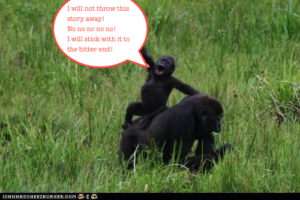“Even if you’re writing crap, at least get something on the page. You can go back and rework it later. You can’t rework a blank page.”
This from a successful author friend today. It’s a good reminder. Many are the times I’ve sat down and known that every word I was writing was not up to my standards. Many times those words have given way, through persistence, to gold. And many times they have not.
You have to have persistence if you’re going to do this work. You have to have more persistence than in most other endeavors, because there are absolutely no guarantees. You can’t guarantee the words are going to flow today. If they do, you can’t guarantee they’re going to make the final cut. If you finish a story, there are no guarantees it’s ever going to see the light of day. If it does, the whole process begins again with the next story.

Yes, it can feel exactly like this.
At a conference I went to, a well-known New York agent, on a panel attended by 250 hopeful fiction writers, said, “I’m going to be honest. Most of you in this room don’t have what it takes to make it.”
People were angry. Some derided the agent, saying he had no right to be so harsh, that he had no idea what we were made of, etc. Others slumped in their seats, staring blankly at the walls, their hands slack in their laps. But I thought what he’d said was brilliant. What kind of a reaction was I going to have to his words? Discouragement? Rage? Hopelessness? Was what he’d said enough to get me to give up?
He’d given us a gift—a chance to see, first-hand, what our level of persistence really was. Did we have enough to hear what he’d said, look deeply into ourselves, catch where his words were accurate and resolve to work on those places, and let them go, cleanly, where they didn’t apply? Or did we diffuse the energy created by his observation by lashing out, either inwardly (“What he said applies to everything in me”) or outwardly (“What he said applies to nothing in me”)?
Another test—Harry Potter was rejected thirty seven times. What if J.K. Rowling had lost her persistence at rejection twenty? Or thirty? We all hold that series up as the wunderkind, the series singlehandedly responsible for bringing kids back to the page. She is lauded for that, and rightly so. Imagine the pressure as her readership grew–it’s one thing to write a story and know it’s your own baby until such time as you decide to bring it forth. It’s another entirely to be pregnant in front of the whole world, with millions of people screaming at you to induce. Many a writer has found their persistence fails them under such pressure. J.K. Rowling has what it takes.
But there is another side to persistence. If you read that first Harry Potter book…it’s really not very well written. (Please put away your pitchforks. She gets better as the series goes on, and I love Harry Potter.) My point is, I can see why it was passed over thirty-seven times. That first book really is a risk.
J.K. Rowling didn’t give up, and she shouldn’t have. But that doesn’t mean you never should. Blind persistence can quickly become irrational obstinance. Some stories must die. It’s the nature of the beast. It means it’s time to start another story, if you really do have what it takes.

Irrational obstinance
And that’s a difficult balancing act: how do you know when to call it with a story, and when to stick in there, stick your neck out again, and keep going? There’s never going be a definitive equation for figuring that out. It’s as individual as each story. But we have a tool: feedback. Which introduces another dilemma: do we take others’ critiques or do we pass on them? How do we know which feedback is good and which is so much sturm und drang?
There is no such thing as an objectively good story. But that doesn’t mean four people telling you your story isn’t good are to be believed. Nor is the opposite, necessarily, to be believed.
So here we are, back at the no guarantees thing. What can we count on? Is there really a still, small voice that endures at our cores and that, after the tornadoes and earthquakes and fires of contradictory feedback and rejections sweep through, we can rely on? If there is, how do we cultivate it? How do we learn to hear its whisper against the incessant howling of our own and others’ thoughts about our writing?
I don’t have any answers. But I persevere.
